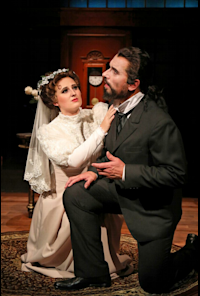Carl Maria von Weber (*18.11.1786 – †5.6.1826) was a German composer, pianist and conductor. His most famous opera The Magician is considered the founding work of German romantic opera, a work historically significant in the development of German opera and opera in general. Weber is the next step in the development of opera between Mozart and Wagner. He enriched the opera with dramatic foundations, worked with typical motifs and themes. Weber set the plot of The Witcher in the Czech forests of Domažlicko (he had a close relationship with the Czechs, he was a conductor at the Estates Theater in Prague). Librettist Friedrich Kind adapted the story from The Book of GhostsAugust F. Laun and Johann A. Apel, which took place in Domažlicko in the period after the Thirty Years' War. The real stories ended tragically – the bride was mortally wounded, her parents died of grief, and the shooter himself ended up in an asylum. The young hunter Max loves the daughter of the forester Kun, but he can only win her as a wife if he wins the shooting competition. Another character is Agatha's second suitor; his name is Kaspar and he uses the lines to his advantage, joins with the devil and talks Max into casting magic bullets in Wolf's Ravine. The balladic story of the opera is dominated by the theme of the eternal struggle between good and evil. Weber's instrumentation brings intense color and mysterious charm. There are many elements of folk song and folk dance in Weber's music. Humanity is associated with supernatural elements in the story. However, the folk characters – the main loving couple and the character of Anička – are conceived realistically.The Huntsman's Bride to the Archer . The opera had a successful premiere in 1821 in Berlin. She captivated the audience not only musically, but also with the contrast of cheerful folk inspirations and masterful portrayal of the terrifying atmosphere of Vlčí rokle and Kašpar's negative characters. The opera has often been staged outside of Germany in various adaptations, and nowadays it is an inspiration for artists working not only in opera, but also in film and musical work.
A musically gifted child, Weber studied with Michael Haydn, brother of the famous composer. He began composing operas at the age of eleven, and at fourteen he staged his opera The Forest Maiden in Freiberg, Saxony. In early 1803, his opera Peter Schmoll and his Neighbors was performed in Augsburg ; then he went to Vienna to study with Abbe Vogler. At the age of seventeen, he was appointed court conductor of the city of Wrocław and worked in the Wrocław opera, later also at the court of Duke Friedrich Eugen Heinrich von Württemberg. In 1813, he accepted the new position of director of the Prague Opera, and a few years later he was already working in Dresden, where he began to create a center for German opera. Weber excelled in the art of instrumentation, which he also applied in his other operas, e.g. in Euryanta and Oberon. Richard Strauss, Igor Stravinsky, Paul Hindemith and Richard Wagner drew on his legacy, who saw Weber as his great predecessor and arranged for the ceremonial transfer of his remains from London to Dresden after his death.
We will present the opera The Archer in the original German, including the prose that connects the vocal numbers in the opera.
Der Freischütz , or The Marksman, is considered to be the founding work of German romantic opera, and it is an important work of German opera and also opera worldwide. Carl Maria von Weber set the plot of the Marksman into Czech woods in Domažlice (the Czech Republic was close to his heart and he was a conductor at the Estates Theatre in Prague). The librettist Friedrich Kind interpreted a story from the book about ghosts by Augustus F. Laun and Johann A. Apel, and it takes place in Domažlice after the Thirty Years‘ War. Real stories ended in tragedy – a fatally wounded bride whose parents die of grief and the shooter himself succumbs to madness. Young hunter Max loves gamekeeper Kuno’s daughter but he can only win her if he wins the shooting competition. Another character is the second suitor of Agathe’s; he is called Caspar and he uses magic in order to gain advantage; he pacts with the devil, and talks Max into making magical bullets in the Wolf’s Glen. The theme of eternal struggle of good and evil dominates the opera’s story. Weber’s instrumentation brings an intense colour and mysterious charm. In Weber’s music there are many elements of folk songs and folk dances. The folklore in the story is associated with supernatural elements . The folk characters – the main lover couple and the character of Ännchen – are, however, presented in a realistic manner. (Ännchen’s character was allegedly inspired by Weber’s future wife.) The opera was arranged in 1817 by the Berlin intendant, Count Carl von Brühl, who suggested to change the name of the opera from the original Hunter’s bride to The Marksman. The opera had a successful premiere in 1821 in Berlin.



